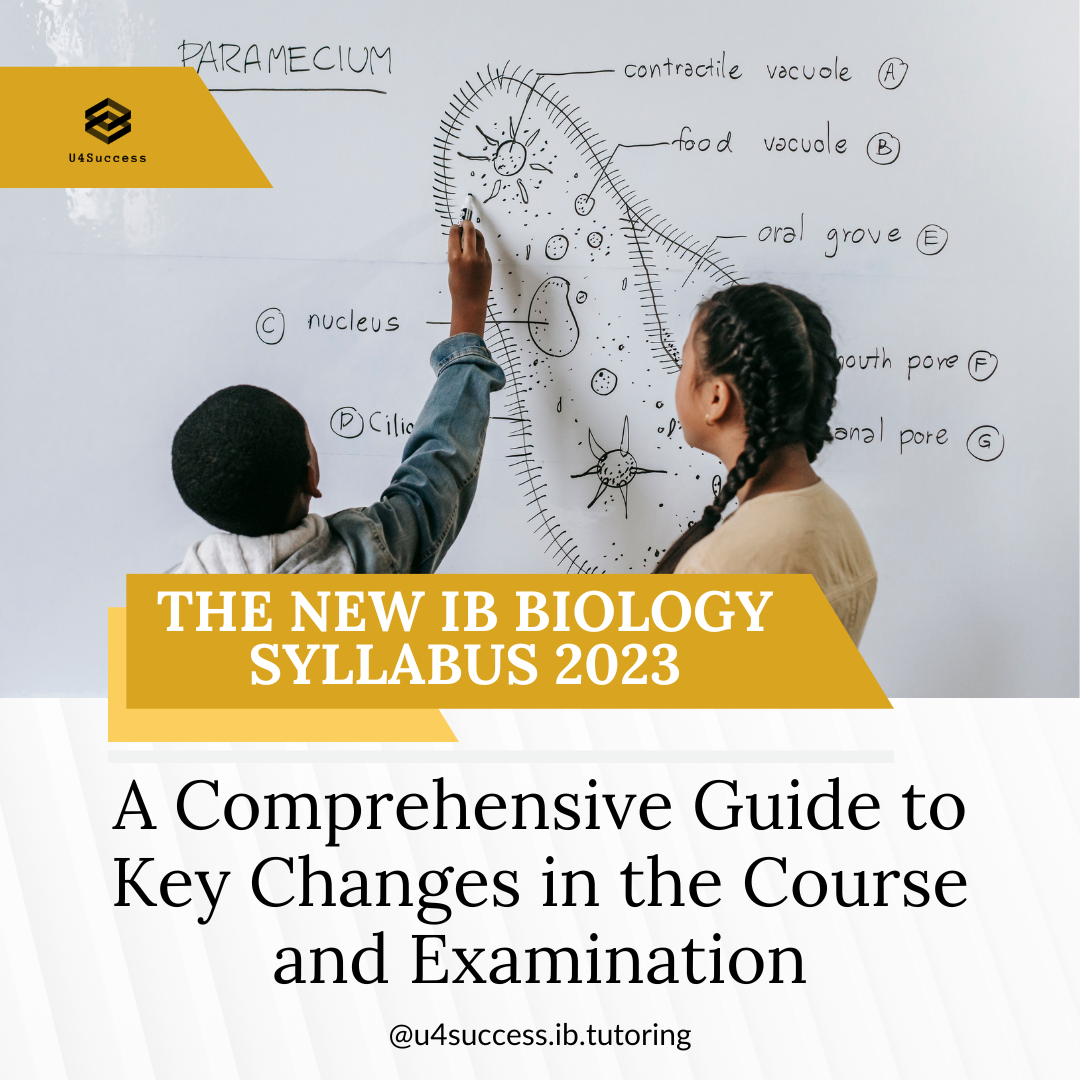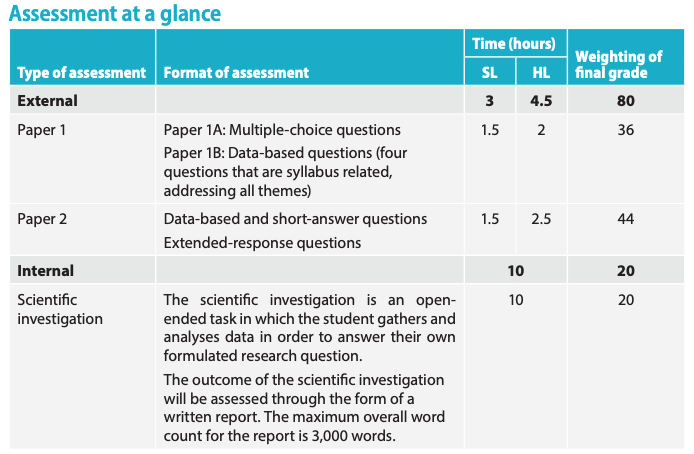The New IB Biology Syllabus 2023: A Comprehensive Guide
Learn about the key changes in the course curriculum and examination
Written by Anzhelika Tauber, MSc
In this article, we present a comprehensive guide to the new IB Biology Syllabus for the year 2023. As experts in the field of biology education, we aim to provide you with all the essential information and resources you need to excel in this course. Whether you are a student, teacher, or simply someone interested in biology, this guide will equip you with the knowledge and understanding necessary to navigate the new syllabus successfully.

Introduction to the IB Biology Syllabus 2023
The International Baccalaureate (IB) program is renowned for its rigorous and comprehensive curriculum, and the IB Biology course is no exception. The new IB Biology Syllabus for 2023 introduces several updates and changes to the previous curriculum, reflecting the latest advancements in the field of biology. These modifications aim to enhance students’ understanding of fundamental biological concepts and promote critical thinking and analytical skills.
Key Changes in the IB Biology Syllabus 2023
- Updated Content: The new syllabus incorporates recent developments and discoveries in biology, ensuring that students are exposed to the most current knowledge in the field. It covers a wide range of topics, including cell biology, genetics, ecology, evolution, and more.
- Integration of Technology: Recognizing the importance of technology in modern scientific research, the IB Biology Syllabus 2023 emphasizes the use of digital tools and resources. Students will learn how to collect, analyze, and present data using technology, enabling them to develop essential skills for future scientific endeavors.
- Enhanced Practical Component: The practical aspect of the course has been strengthened to promote hands-on learning and scientific inquiry. Students will engage in various laboratory experiments, investigations, and fieldwork, fostering their understanding of scientific methods and principles.
Here is the link to the complete description of the new IB Biology course. And here you can find detailed changes to the content.
New IB Biology 2023 External Assessments: What You Need to Know
The International Baccalaureate (IB) Biology syllabus for 2023 introduces several changes to the external assessments. While the four assessment objectives have been retained, there are slight changes in the wording of each objective.
Examination Paper Changes
The IB Biology exam papers for 2023 have undergone notable changes to enhance the assessment experience for students. Here are the key modifications:
- Calculator Use: Students are now permitted to use a calculator in Paper 1, which includes multiple-choice questions. This change aims to support students in solving calculations efficiently and accurately.
- Question Placement: The questions on experimental work and skills have been moved to Section B of Paper 1. This restructuring provides a dedicated section for assessing students’ practical skills and experimental understanding.
- Number of Examination Papers: In the new syllabus, there are now only two examination papers for each level—SL and HL. This reduction in the number of papers streamlines the assessment process while maintaining the integrity of the examination.
- Similar Exam Session Length: The two exam sessions, SL and HL, have been made more similar in length. This adjustment ensures equitable examination conditions for all students, regardless of the level they are pursuing.
- Weighting of SL and HL Papers: The weighting of SL exam papers is now equal to HL papers, allowing for a balanced assessment of knowledge and skills across both levels.
IB Biology Exam Paper Details
To understand the structure of the IB Biology 2023 exams, let’s delve into the specifics of each paper:
IB Biology 2023 SL Paper 1
- Total time: 1.5 hours
- Total raw mark: 55
- Component weighting: 36%
- Two booklets completed without interruptions on SL level material only.
- Section A: 40 multiple-choice questions (40 marks).
- Section B: Data-based and experimental work questions (35 marks).
IB Biology 2023 SL Paper 2
- Total time: 1.5 hours
- Total raw mark: 50
- Component weighting: 44%
- Short-answer and extended-response questions on standard level material only.
- One extended-response question (from a choice of two) on standard level material only.
IB Biology 2023 HL Paper 1
- Total time: 2 hours
- Total raw mark: 75
- Component weighting: 36%
- Two booklets completed without interruptions on SL and AHL material.
- Section A: 40 multiple-choice questions (40 marks).
- Section B: Data-based and experimental work questions (35 marks).
IB Biology 2023 HL Paper 2
- Total time: 2.5 hours
- Total raw mark: 80
- Component weighting: 44%.
- Data-based questions.
- Short-answer and extended-response questions on SL and AHL material.
- Two extended-response questions (from a choice of three) on standard level and additional higher level material.

New IB Biology 2023 Internal Assessment: The Scientific Investigation
The internal assessment in IB Biology has undergone changes and is now called “The scientific investigation.” This component still accounts for 20% of the overall assessment, with the remaining 80% allocated to the external assessment. While the allocated time of 10 hours remains the same, there are several key updates:
- Renaming: The internal assessment is now referred to as “The scientific investigation.” This change reflects a broader understanding of the purpose and nature of the assessment.
- Collaboration: Students can now collaborate in groups of up to three when planning and carrying out the investigation. This collaborative approach allows students to share similar methodologies, provided that each student collects data on different independent or dependent variables. It fosters teamwork and encourages the exchange of ideas.
- Individual Research Questions: Although collaboration is encouraged, each student must have their own individual research question. This requirement ensures that students engage in independent thinking and develop a deeper understanding of their chosen topic.
- Word Count and Assessment Criteria: The maximum overall word count for the written report is 3,000 words, with clear guidance on what counts as a word. The report is assessed based on four criteria: research design, data analysis, conclusion, and evaluation. Each criterion carries equal weighting, with 6 marks allocated for each, resulting in a total of 24 marks. The revised criteria emphasize concluding and evaluating skills, with 50% of the marks allocated for Conclusion and Evaluation.
It is crucial to note that while the name and assessment criteria have changed, the fundamental purpose of the scientific investigation remains the same. This assessment component allows students to develop scientific skills through designing, carrying out, and reporting on their own research projects. The updates in the IB Biology 2023 syllabus provide students with more flexibility and opportunities to work collaboratively while ensuring that they are still assessed on the necessary scientific skills.

Get IB updates in your inbox

About the Author
Anzhelika is a PhD candidate in Genetics and a marketing consultant at U4Success from Vienna, Austria. She leads our website and social media content strategy.
